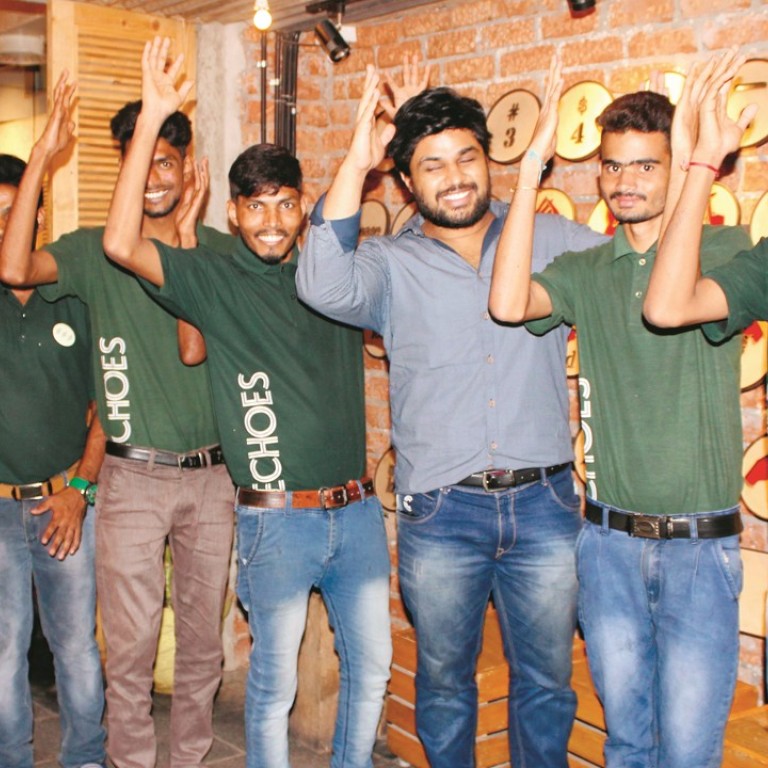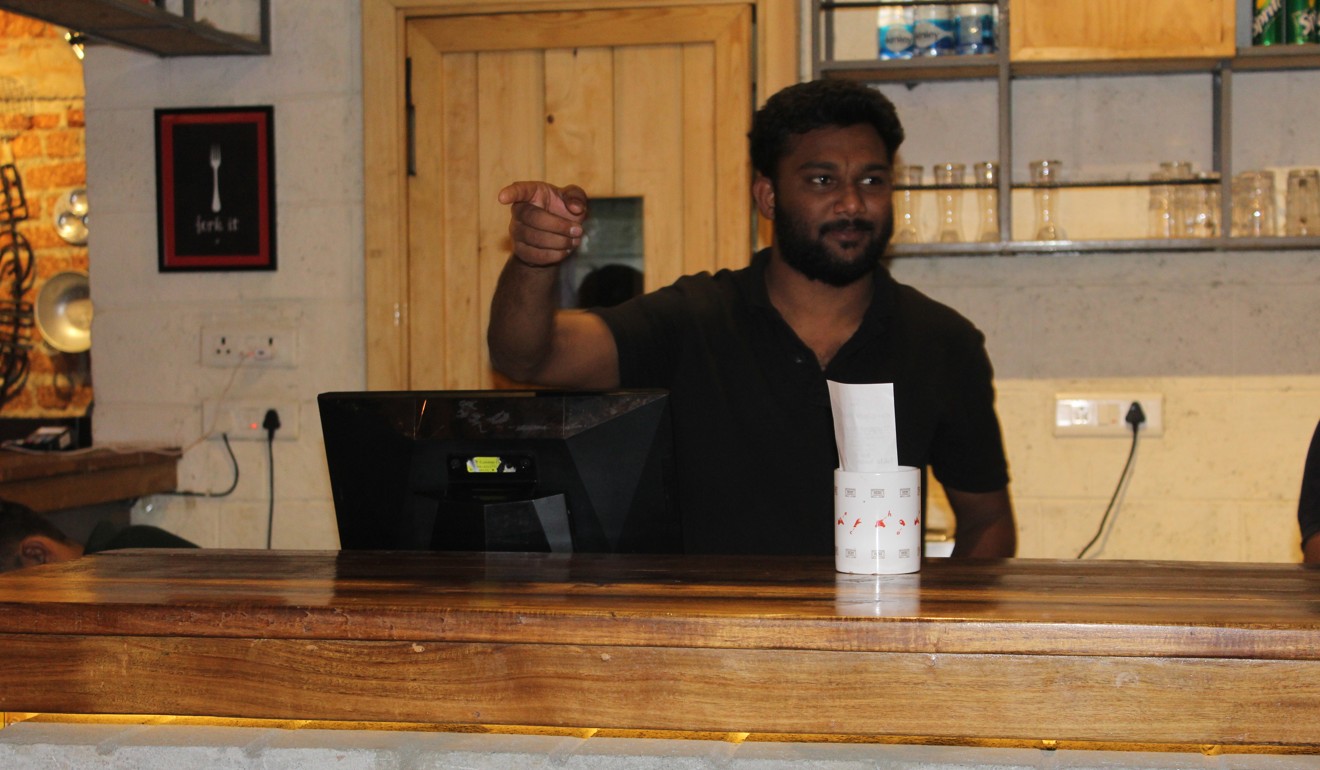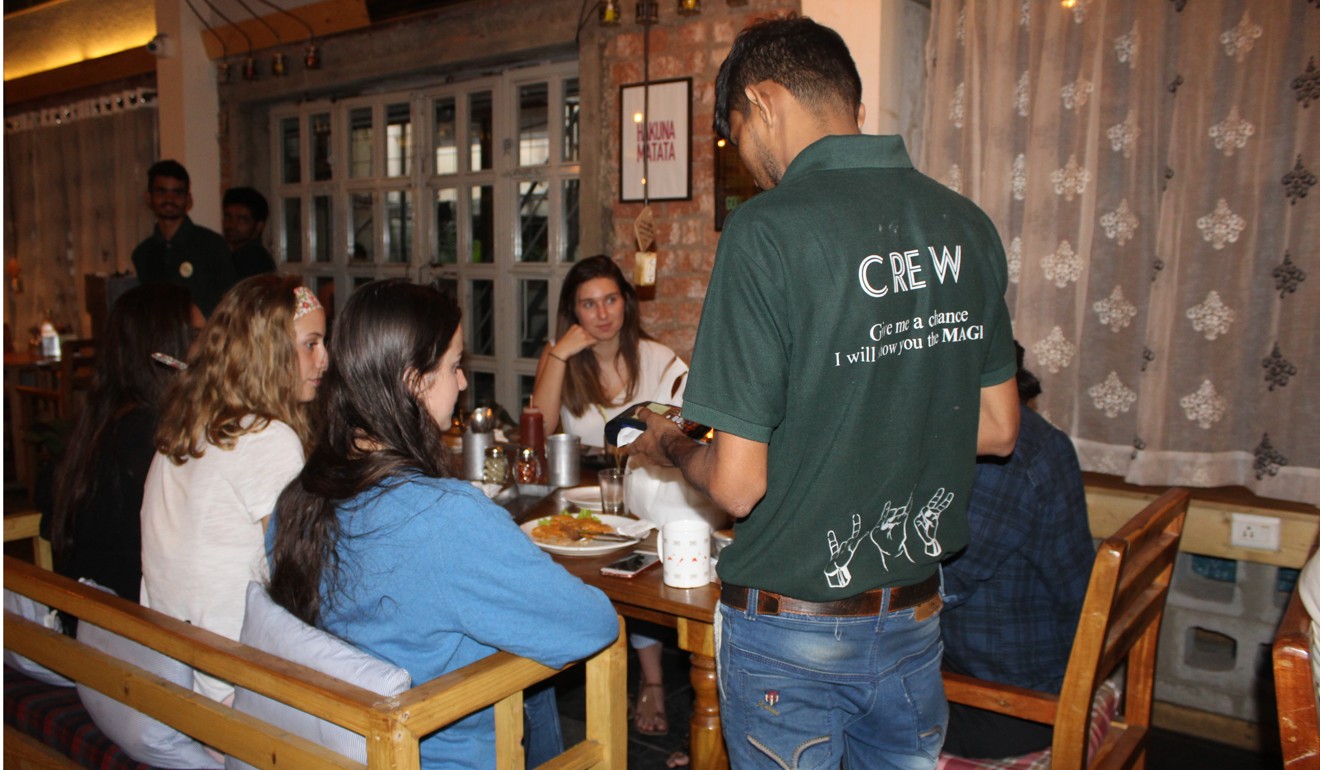
Businesses in India see benefits of hiring staff with speech and hearing impairments
- Restaurant owners find that staff who cannot hear or speak are less easily distracted, and smile more, than non-disabled staff
- Some businesses now make their hiring of disabled staff a selling point
It’s a busy Saturday evening for Nabeel C.H., the floor manager at Echoes Koramangala, a multi-cuisine dining space in an upscale Bangalore neighbourhood.
All 12 tables in the restaurant are occupied and more people are waiting in the anteroom. Some are reading the feedback left by visitors on tissue paper tacked on a wall. Others are attempting to sign their names using cues from the sign- language keyboard spread over another wall.
How khichdi, mix of lentils and rice, became India’s ‘national dish’
A few are on their phones, searching for “hello” and “thank you” in sign language, so they can exchange greetings with the speech- and hearing-impaired waiting staff inside.
As one couple leaves, Nabeel reaches out to a pair of other guests in the anteroom, guiding them to a table. He fetches a menu card and a notepad for them to scribble the codes, quantities and any special requirements for the dishes they wish to order.

He moves his index finger from the light switch hanging above, and points to the light bulbs above the cash counter, showing the guests how they light up and alert staff to pick up an order. A set of cue cards on the table indicates how they can ask for water, a menu or cutlery.
Nabeel is a happy-go-lucky 26-year-old from the nearby Indian state of Kerala, who moved to Bangalore last year to work at Echoes Koramangala, which prefers to employ speech- and hearing-impaired staff like him.
The 50-seat restaurant is one of many that are hiring deaf and mute staff to show that they care about inclusion. But the hiring decisions at Echoes Koramangala have nothing to do with charity.

“I’ve found speech- and hearing-impaired persons to be quick learners, more focused and less distracted,” says Karthik Sagiraju, one of the restaurant’s four co-founders.
Prashant Issar, the co-founder of Mirchi and Mime, a Mumbai restaurant employing a large number of deaf and hard-of- hearing staff, agrees.
“Unlike a lot of servers I’ve come across, speech- and hearing-impaired staff smile often, and are intuitive about the needs of guests,” says Issar, who has now sold his restaurant and moved on to create other, similar venues. “These are their superpowers.”
Unlike a lot of servers I’ve come across, speech- and hearing-impaired staff smile often, and are intuitive about the needs of guests
Meera Shenoy, who heads Youth4Jobs, an organisation that trains youth with disabilities for employment, says the food and beverage, and hospitality industries are the largest employers of speech- and hearing-impaired people. “I’ve seen this trend pick up in the past year,” Shenoy says.
Her organisation has trained 5,300 young deaf and mute people in six years, of which almost 70 per cent are working in the formal sector – where terms are fixed – in industries including fast food, hospitality, manufacturing, and beauty and wellness. Only a small fraction of employees in India work in the formal sector, which comprises publicly traded companies, incorporated or formally registered entities, corporations, factories, shopping malls, hotels, and large businesses.
An Indian study estimates there are more than 60 million people in India with significant hearing loss. Until a few years ago, very few of those affected could find work in the formal sector.
India’s Rights of Persons With Disabilities (RPWD) Act reserves four per cent job of public sector jobs for people with disabilities, and requires every private company with 20 or more employees to have a written policy on disability. The law makes discrimination against disabled people illegal; however, it only became law in April 2017, and implementation has been slow.
Shenoy, who conducts workshops with organisations to create awareness about the skills of disabled people, has found a lack of awareness of the law. Multinational companies stand out for their inclusive policies, she says.
Most independent Indian restaurants and cafes hire speech- and hearing-impaired staff because they have seen the concept working elsewhere, she says.

For restaurateur Sagiraju, a volunteer with organisations working for disability rights, had a chance meeting three years ago with Naresha, a deaf and mute employee at an Indian coffee chain.
“Just looking at him communicate in sign language was so magical,” he recalls. “I was quite curious about all that he did, and happened to learn that he switched jobs every few months. I asked him, ‘don’t you want to stay in one place and make a stable career?’”
What Naresha told him set Sagiraju on his journey with Echoes Koramangala.
In Delhi they said, ‘This is not Indian’. How chef changed Indian food
“I always feel like the odd one out wherever I work,” Naresha told Sagiraju in sign language; often he found himself the only deaf and mute employee in his workplace.
“So I thought, what if I could reverse this situation for him? What if I could employ so many from the community that they never want to quit?” Sagiraju says. His restaurant opened in March 2017, with six deaf and mute employees. It now has 16, including the floor manager and the cashier. That is 40 per cent of his staff.
Entrepreneur Anil Kohli founded a chain of Chai Pe Charcha tea rooms in Mumbai with the intention of creating more job opportunities for disabled people. Having lived with a disability since birth, he understands the hurdles disabled people face in finding jobs.
Today, 12 of his 30 staff are disabled; 10 are deaf and mute. One of his outlets is managed by a deaf and mute person.

“I believe in giving my staff the liberty to experiment and don’t box them into job structures. How else will they know their skills and aptitudes?” Kohli says.
Lemon Tree Hotels, a mid-priced hotel chain in India, hired its first disabled staff 12 years ago as a way to give back to society. Their number has since increased from two to 550, including speech- and hearing-impaired people, many of whom work in the chain’s restaurants.
Hiring people with disabilities is part of the brand’s business model and a unique selling point, and they account for 12 per cent of the workforce.
In India, not many young and educated men and women like to work in a restaurant, but for the deaf and mute, who have limited job opportunities, these appointments are aspirational, Shenoy says. “Hiring them brings down the attrition rate, which is so high in this industry,” she says.

Most of the young deaf and mute people who seek such jobs, Shenoy adds, are the first ones in their families to work in the formal sector or in an urban setting. As well as being trained in such things as English and how to use computers, they are also taught about their approach to work.
Shenoy often tells them that it is critical to do their best in their first job, and not quit if someone else in the community is unhappy with their employer.
“It took me some time to win the trust of my staff,” Sagiraju says. One of the things that worked was his daily interaction with them. “Whom will they talk to, if not us? How many people understand sign language? We help staff with all their issues, even those outside the restaurant.”
We help staff with all their issues, even those outside the restaurant
Nabeel is happy and feels well looked after in his workplace. “When I joined, I was apprehensive about my choice to work as a waiter, but now I think this is the perfect job for me,” he signs. He rose to the position of a floor manager in just nine months.
“Customers do not complain about communicating with waiting staff who sign; they like to come here for the experience,” Sagiraju says.
“People like to spend money on a brand that works for social good,” adds Shenoy.
Pritika Srivastava, a college student who was dining for the first time at Echoes Koramangala, says she found the waiting staff very congenial.
“My server Dadaper was so attentive and patient in understanding my needs, I didn’t need to make any effort at all,” she says. For Srivastava’s friend, Yashashwani Mittal, it was a lesson in inclusion.
Mittal says: “It’s the first time I’ve seen deaf and mute people work, and I’m happy to find how well they have blended in this environment.”
Mix hakka noodles, dosa, and Michelin, and what do you get?
“My staff love the appreciation and enjoy the attention,” Sagiraju says with a smile. “More importantly, they are thrilled to know that people want to enter their world and understand them.”
